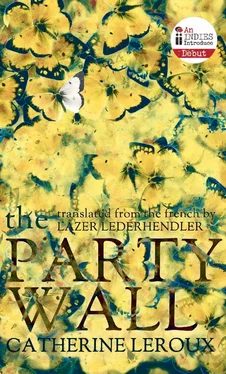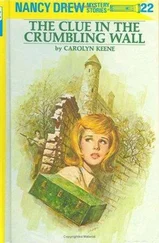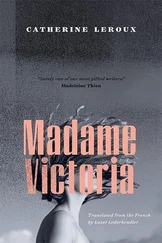Marie was the one who suggested he put on fifteen kilos. This simple idea was the missing piece of the camouflage. Ariel was nowhere to be seen in the new, bulkier body, as if he were concealed in his own flesh. In any event, in this region of vast distances, where neighbours are recognized by virtue of their cars more than their faces, no one studies them up close. The inhabitants of central Saskatchewan have become so scarce they hardly look at each other and are identified from a sideways glance at their hairdos, their voices, the unique vibration of their presence, always perfectly distinct from someone else’s.
The town of Rockfield is a place where one quickly feels at home but to which one never belongs. “Too windy, too flat,” Ariel notes. Very soon the cashiers in the stores recognize Marie (or, rather, Anne) and call her by her alias, and the waiter at the café remembers that Ariel takes two sugars in his coffee. Both of them find this fabricated life deeply comforting. Here, no one will photograph them surreptitiously, no one will cover their house with graffiti. No one will shoot at them.
Marc, who still has friends in the army, helped Ariel find a job on the military base located in the vicinity. It involves introducing recruits to international politics and law. The young soldiers put him in mind of tight shells that crack open upon discovering the complexity of the world, the magnitude of the underflow that shapes its movements and tremors. The job, chosen by default, has grown on him. He likes giving these men, barely out of adolescence and the insulated world of rural traditions, a horizon, however condensed, and enabling them for a brief moment to enjoy an informed view of the countries where they will soon serve as cannon fodder.
As for Marie, she teaches French to kids who are completely untouched by the notion of the founding peoples and the bilingual imperative, now virtually obsolete in a province long ago swallowed up by the majority. Fortunately, they are also too young to understand their parents’ disdainful remarks about the “lazy people’s language,” and they have no reservations about singing the old-fashioned songs that Marie teaches them: Il était un petit navire, À la claire fontaine, Alouette , and so on. She takes pleasure in watching them recite the confused syllables with open mouths or lean over the coloured keyboards, typing away with wondrous dexterity, their pudgy fingers hopping effortlessly from key to key like ignorant, agile little birds.
Sometimes Ariel comes to meet her at the end of the day and stations himself near the classroom door to watch her, pale and eager in front of her captive audience. Then he contemplates his own reflection in the glass door — fat, bearded, disappointing — and once again realizes she is worth all the failures, all the humiliations, all the relinquishments. Marie, his half of the world.
Ariel’s mother could not stop crying and his father clenched his teeth so hard that a fine snow might have appeared between his lips had he not pressed them together so tenaciously. The Leclercs, for their part, paced up and down and shuddered — the outward expression of their ineffable distress. In both cases it was not easy to know whether their families were reacting to the drama itself — the unmentionable word incest —or something else. Marie suspected her parents were no less horrified by their circle having learned their daughter was adopted, a fact that contradicted the notion of a bloodline as strong and pure as the water of the last glaciers. As for the Goldsteins, Ariel wondered if they were in fact mourning the fall of their angel, the end of their dreams of glory. One night on his way to the bathroom he even overheard his mother whispering, “None of this would have happened if he had become a dentist.”
“You’re going to divorce,” Martial declared in a tone that was more imperative than interrogative.
“We have no choice; the law obliges us to dissolve the marriage.”
“But you are still living together?”
“Until the dust settles and we’ve sold the house,” Marie replied half-heartedly.
The truth was they had no wish to separate. There was no one anymore who could look at them in a way that was unmarred by disgust. They were their only refuge.
In the meantime, Marc investigated, slowly but determinedly retracing the steps of the scandal to its source. The Canada of shining tomorrows was dead and a culprit had to be found, a traitor to be crucified in the history books or, at the very least, a name to be placed on a list of enemies and slipped into the inside pocket of a jacket, over the heart.
In March the snow does not melt so much as evaporates, leaving the fields dry and dirty. Then in June the pitiful wisps of grass that remain catch fire here and there, speckling the plain with orange-coloured nests of desire. In August the temperature drops inexplicably and the ground freezes, imprisoning thirsty spiders and snails in the frost. In October, the rain awaited since the spring equinox finally decides to fall, trapping the houses in a turbid lake.
Luckily the place is equipped with a canoe, wisely stored on the upper floor, this sort of deluge having become a common occurrence on the Prairies. For a week Ariel and Marie move about by paddling, with no definite destination, for the simple pleasure of exploring the region without submitting to the dictates of roads and territorial boundaries. They come across a few frantic deer, several soggy cows, and a handful of neighbours searching for dry patches. They are looking for earth or sand banks to fill some bags and keep the water from flooding their basements. As if that were possible.
At night, the darkness is so opaque that Ariel and Marie feel as though they are floating in a submarine. The big diseased trees, whose bark has begun to give off a rotten stench, turn into giant algae surrounded by whirling swarms of bats and gnats. Occasionally, persistent glimmers appear in an atmosphere too damp to belong to the ground, and Marie and Ariel move closer, plunging into the private lives of neighbours of whom they know the names but not the faces, the number of children but not the joys and woes. Besieged by the flood, the inhabitants take shelter in front of their screens, where they find comfort in news from abroad a hundred times worse than their personal calamities; they crowd around meals based on canned foods that had been stored in deep larders in expectation of this sort of climatic glitch. Occasionally a naked couple brushes by a window they had not bothered to cover, certain of being alone in the ruined vastness of the Prairies. Two bodies sizing each other up, consoling each other, revelling in one another.
“Do you miss it?” Marie asks.
In the darkness Ariel stays mute. Of course he misses it, and Marie knows it. He wishes they had never had sex or that it were transformed into a superior act, a sort of communion that could not be associated with anything and to which no horrid labels could be attached. He wished he were living in one of those courtly poems where love is elaborated in extended metaphors and prolonged hand-kissing, and had never looked at his twin sister with the carnivorous eyes of men when they are something akin to animals. But it seems to him now that sex can no longer be extracted from the equation. Marie drops her paddle in the canoe and moves toward him.
“It doesn’t have to be sordid, you know. We’re the ones who determine the meaning of our acts.”
She presses her cheek against his, her breast against his shoulder. She waits. Ariel dares not budge, but each of his atoms becomes electrically charged and hurtles toward Marie.
“It’s all a question of designation,” she continues. “Here, we’re just a couple like any other.”
Читать дальше











